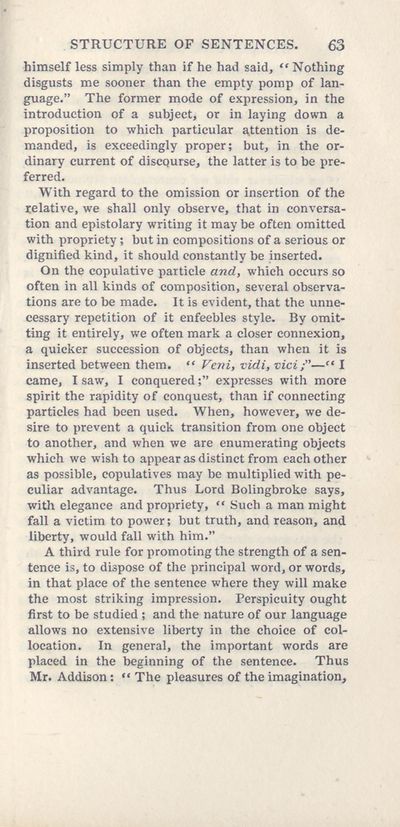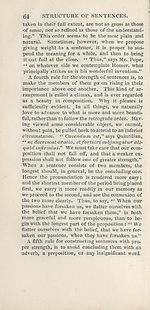Education > Essays on rhetoric
(91)
Download files
Complete book:
Individual page:
Thumbnail gallery: Grid view | List view

STRUCTURE OF SENTENCES. 63
himself less simply than if he had said, “Nothing
disgusts me sooner than the empty pomp of lan¬
guage.” The former mode of expression, in the
introduction of a subject, or in laying down a
proposition to which particular attention is de¬
manded, is exceedingly proper; but, in the or¬
dinary current of discourse, the latter is to be pre¬
ferred.
With regard to the omission or insertion of the
relative, we shall only observe, that in conversa¬
tion and epistolary writing it may be often omitted
with propriety; but in compositions of a serious or
dignified kind, it should constantly be inserted.
On the copulative particle awrf, which occurs so
often in all kinds of composition, several observa¬
tions are to be made. It is evident, that the unne¬
cessary repetition of it enfeebles style. By omit¬
ting it entirely, we often mark a closer connexion,
a quicker succession of objects, than when it is
inserted between them. ** Veni, vidi, vici “ I
came, I saw, I conqueredexpresses with more
spirit the rapidity of conquest, than if connecting
particles had been used. When, however, we de¬
sire to prevent a quick transition from one object
to another, and when we are enumerating objects
which we wish to appear as distinct from each other
as possible, copulatives may be multiplied with pe¬
culiar advantage. Thus Lord Bolingbroke says,
with elegance and propriety, “ Such a man might
fall a victim to power; but truth, and reason, and
liberty, would fall with him.”
A third rule for promoting the strength of a sen¬
tence is, to dispose of the principal word, or words,
in that place of the sentence where they will make
the most striking impression. Perspicuity ought
first to be studied ; and the nature of our language
allows no extensive liberty in the choice of col¬
location. In general, the important words are
placed in the beginning of the sentence. Thus
Mr. Addison: ** The pleasures of the imagination.
himself less simply than if he had said, “Nothing
disgusts me sooner than the empty pomp of lan¬
guage.” The former mode of expression, in the
introduction of a subject, or in laying down a
proposition to which particular attention is de¬
manded, is exceedingly proper; but, in the or¬
dinary current of discourse, the latter is to be pre¬
ferred.
With regard to the omission or insertion of the
relative, we shall only observe, that in conversa¬
tion and epistolary writing it may be often omitted
with propriety; but in compositions of a serious or
dignified kind, it should constantly be inserted.
On the copulative particle awrf, which occurs so
often in all kinds of composition, several observa¬
tions are to be made. It is evident, that the unne¬
cessary repetition of it enfeebles style. By omit¬
ting it entirely, we often mark a closer connexion,
a quicker succession of objects, than when it is
inserted between them. ** Veni, vidi, vici “ I
came, I saw, I conqueredexpresses with more
spirit the rapidity of conquest, than if connecting
particles had been used. When, however, we de¬
sire to prevent a quick transition from one object
to another, and when we are enumerating objects
which we wish to appear as distinct from each other
as possible, copulatives may be multiplied with pe¬
culiar advantage. Thus Lord Bolingbroke says,
with elegance and propriety, “ Such a man might
fall a victim to power; but truth, and reason, and
liberty, would fall with him.”
A third rule for promoting the strength of a sen¬
tence is, to dispose of the principal word, or words,
in that place of the sentence where they will make
the most striking impression. Perspicuity ought
first to be studied ; and the nature of our language
allows no extensive liberty in the choice of col¬
location. In general, the important words are
placed in the beginning of the sentence. Thus
Mr. Addison: ** The pleasures of the imagination.
Set display mode to:
![]() Universal Viewer |
Universal Viewer | ![]() Mirador |
Large image | Transcription
Mirador |
Large image | Transcription
| Antiquarian books of Scotland > Education > Essays on rhetoric > (91) |
|---|
| Permanent URL | https://digital.nls.uk/113760584 |
|---|
| Description | Thousands of printed books from the Antiquarian Books of Scotland collection which dates from 1641 to the 1980s. The collection consists of 14,800 books which were published in Scotland or have a Scottish connection, e.g. through the author, printer or owner. Subjects covered include sport, education, diseases, adventure, occupations, Jacobites, politics and religion. Among the 29 languages represented are English, Gaelic, Italian, French, Russian and Swedish. |
|---|

